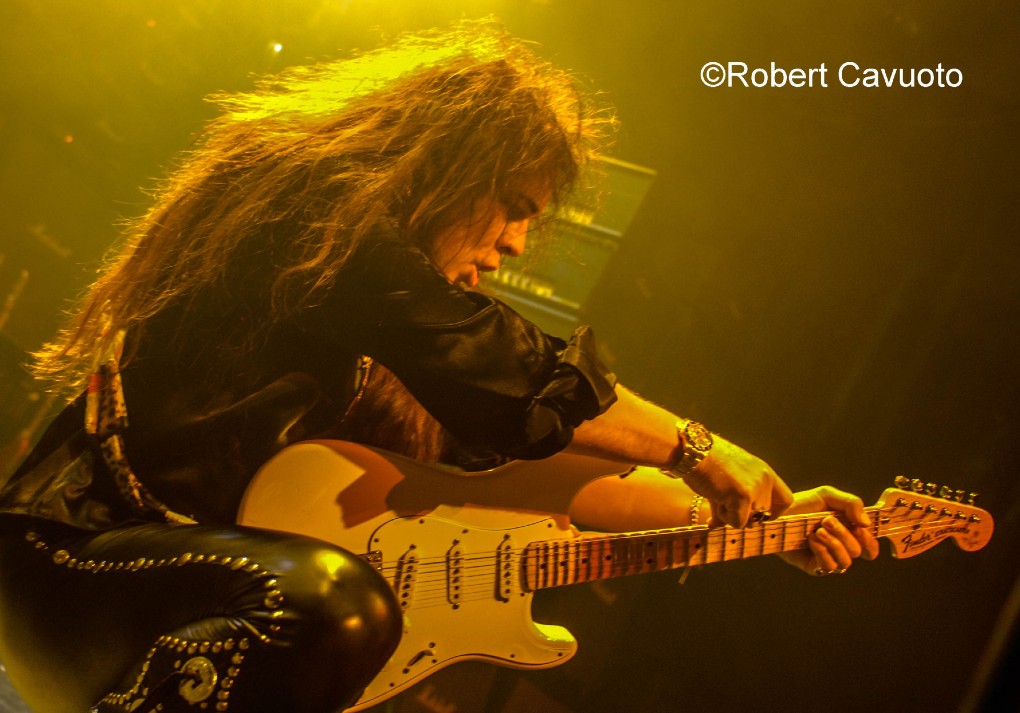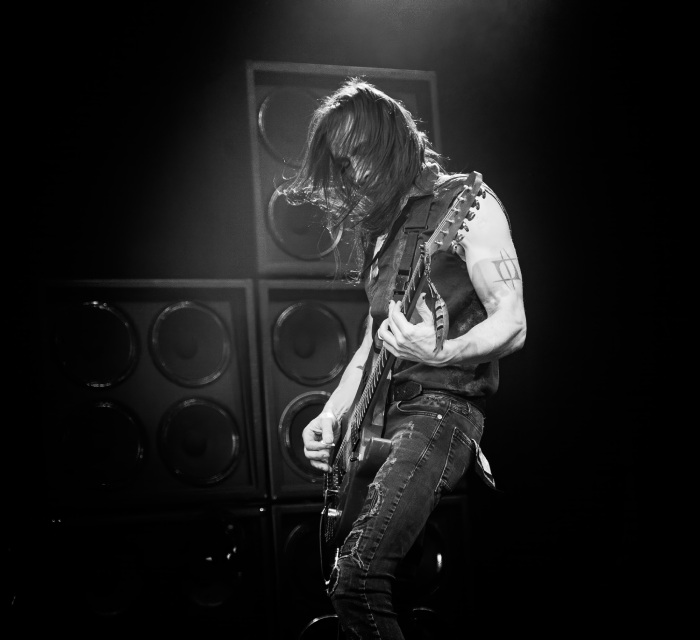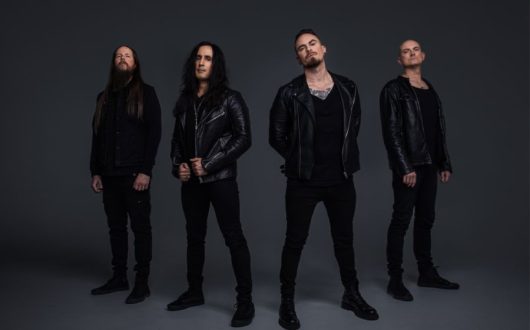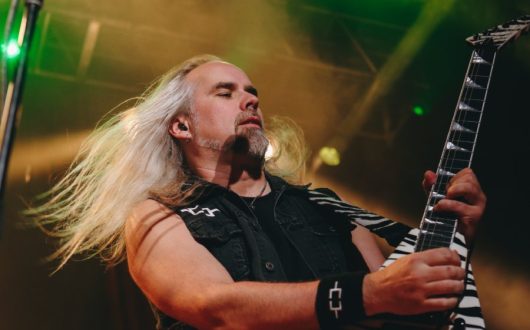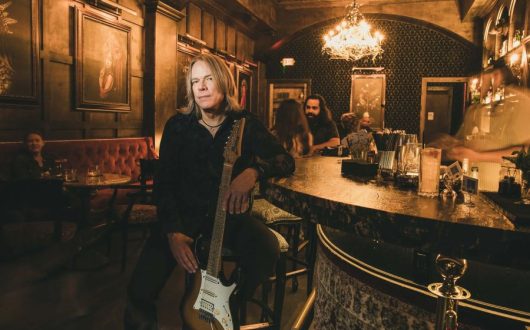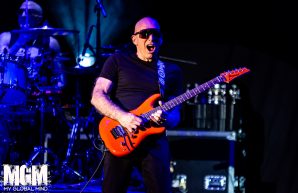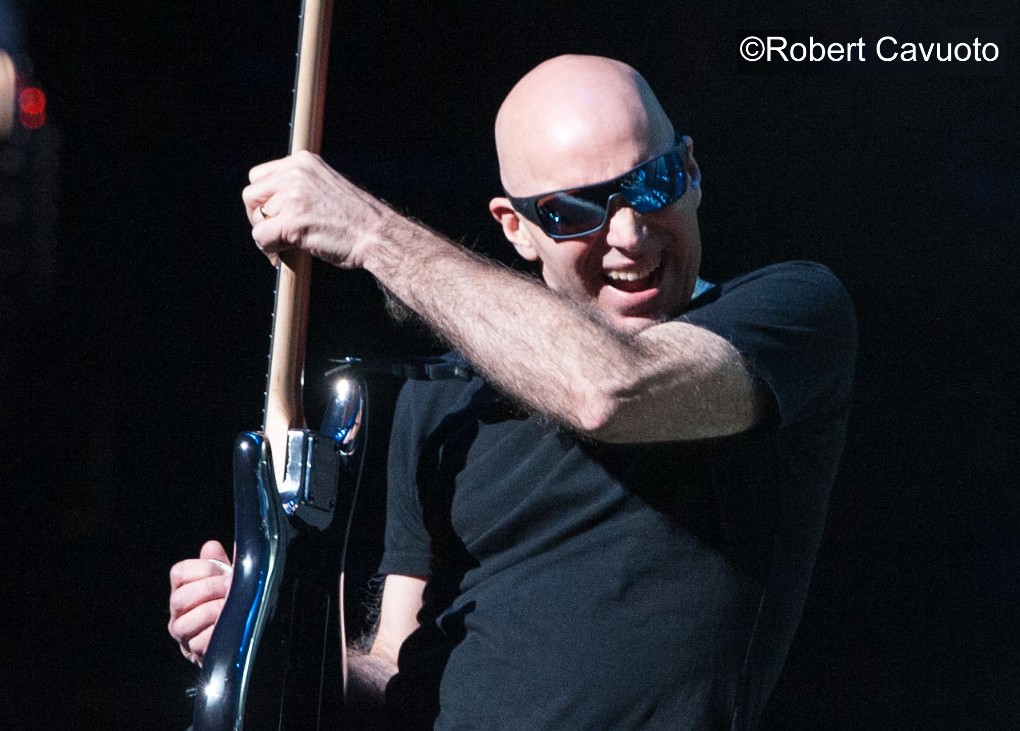Interview and Live Photos by Robert Cavuoto
Guitar God, innovator, and virtuoso are the first three things that come to mind when you think of Yngwie Malmsteen. He is one of the most respected guitarists in the world who has forged an outstanding 40-year career with his unique style of neo-classic guitar playing.
His fiercely powerful new CD, Parabellum, will be released July 23rd via Music Theories Recordings / Mascot Label Group. For this release, Yngwie cranks up the energy level to take listeners on an emotional journey, expressing himself and bending sound as well as listeners’ minds throughout. Songs like “Wolves at the Door” and “Relentless Fury” are fast, furious, dark, malevolent, and oozing with attitude that not only showcases Yngwie’s superb playing but show the world what he can take on lead vocals as well. Instrumental songs like “God Particle” and the title track “Parabellum” continue to cement his legacy as the master neo-classical guitarist. Pre-orders for Parabellum can be found here: http://smarturl.it/Yngwie_Malmsteen.
I had the honor of interviewing one of the best rock guitarists of our time to talk about the creation of Parabellum, what inspires him to write such masterful songs, why he is the most grateful person on the planet, and his constant desire to grow as a musician!
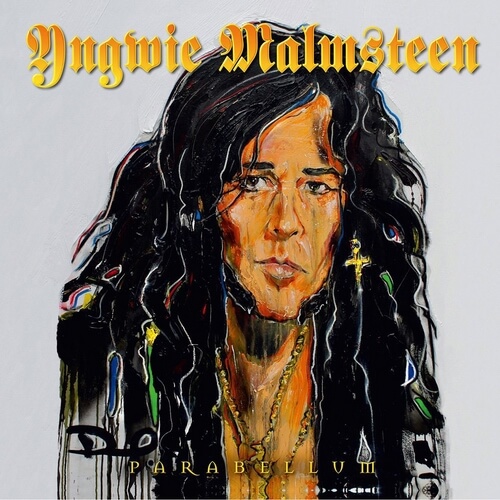
Robert Cavuoto: Tell me about how and when inspiration strikes you when creating such great instrumental songs like “God Particle” and “Parabellum?”
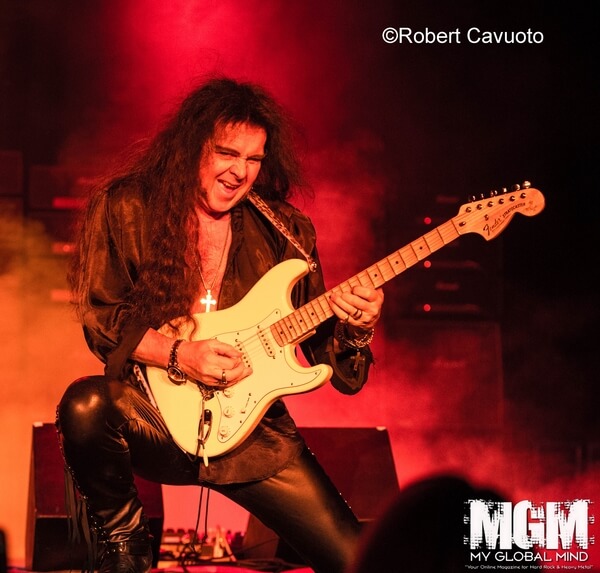
Yngwie Malmsteen: That’s a great question! Take for instance, the song “Black Star.” It was written when I was 17 years old as a soundcheck to test out my new mixing board. There was nobody in my room, so I mic’d up the drum set and started playing a beat. The drums sound really good, so I added bass and then keyboards. I was playing E minor – C and E minor – C. From there, I put on a twin guitar melody with some overdubs. That song has become very well known, but that was created as a soundcheck [laughing]! There have been other times when I had to sit down to play, but it’s really not my favorite thing to do. My favorite thing to do is turn on the TV and improvise, and out of nowhere, like blue lightning it hits [laughing]! When something comes out, I have no idea where it comes from! I will not remember it, so I run into the studio. I have the luxury of having a studio where I do all my guitar work, not demo quality mind you, as the room is fully mic’d with 60 Marshall heads or some stupid amount! I can actually use my actual spontaneous parts instead of trying to re-record them. I don’t know where these ideas come from, they just happen, and they are my favorite ideas. If that theme, riff, or melody lends itself to a song, so be it! It can be part of a structure of a mini concerto where there so many things are happening. Then I can sit down and write because I’m inspired. Somebody gave me a gift. If you asked me to write a country song, I could do it. If you asked me to write an AC/DC style song, I could do it because I have learned through all the years of playing that music has structure, and you just need to put it together. Unfortunately, it doesn’t inspire me. It doesn’t make me go, “Fuck, that is something!” The song “Parabellum” off the new CD came out of nowhere and just hit me! I was so thrilled with it and knew I had to use it. I had over 100 different ideas for this new CD because I have been sitting home for a year [laughing]. All of these came like a vision of inspiration. That is the most rewarding thing to me. I can’t just press a button to get that to happen. When I sit down and have to write, those songs don’t mean that much to me. With this record, everything is fresh, and that is what it is all about!
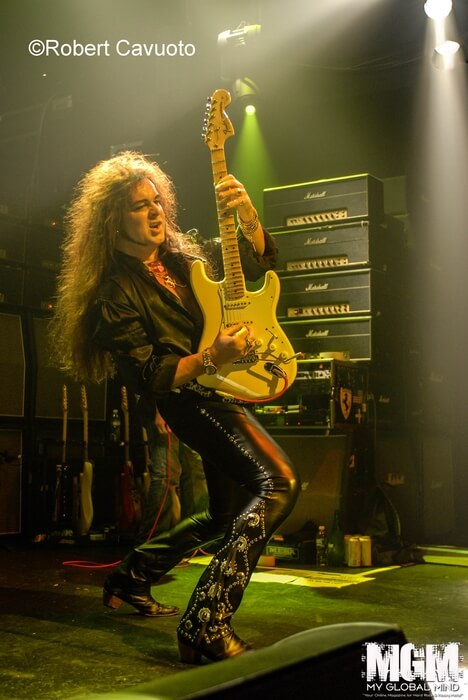
Robert Cavuoto: After 40 years of writing songs, tell me how you never run out of inspiration for emotional and impactful songs and lyrics?
Yngwie Malmsteen: I appreciate you saying that as it’s a really nice thing to say. As I mentioned, it’s almost like a divine thing. I’m almost in awe when it happens. There are only 12 notes in the chromatic scale, and there are only so many combinations of them that you can play. You can get into some weird stuff with Jazz, and I’m not knocking Jazz; it’s just not pleasing to the ear for me. I want to hear melodies, like Mozart said, “Melody is music, and music is melody.” I have always lived by that. When I pick up the guitar because I really want to, it’s all true inspiration. It’s like when I first started to play; it’s was inspiring. I’m blessed to have the luxury to pick and choose ideas. Back in the day, when you were renting a studio for $5,000 a day, you had to fucking do it to get it done! That was horrible!
Robert Cavuoto: “Eternal Bliss” is my favorite song on the record. You have the line in it “God has blessed me with all I have dreamed of.” Tell me about the importance of that sentiment, as you also mention it in your 2013 book, Relentless the Memoirs?
Yngwie Malmsteen: I’m really, really pleased to see that you are picking up on that! A lot of times, people sing well, but it’s not straight from the soul. Right now, I’m sitting in the sunshine by the beach, and I have to pause and think how blessed I am. I am a very dedicated and hard-working person. Like the lyrics in the song, everything I have ever dreamt of I got! I am so thankful. I am the most grateful person on the planet. I feel that being grateful is the key to happiness. You can have everything in the world, but if you are not grateful, then you can’t appreciate it. It is a bizarre thing to explain. I have an amazing wife, beautiful son and have everything I have dreamt of. I’m not bragging, I’m grateful for what I have, and I’m not talking about material things. It’s just where I am at in life with being able to make the music that I love.
Robert Cavuoto: “Wolves at the Door” and “Eternal Bliss” show the world that you can not only write melodic songs but sing them powerfully. Tell me about your decision to take on the lead vocal duties?
Yngwie Malmsteen: It isn’t anything new really. Growing up and being in bands like Rising Force and Powerhouse, I took on the singing responsibility. It was just me, a drummer, and a bass player; insert name here because I had everyone in Sweden whoever played bass in my band and one time or another [laughing]. When I came to America and joined Steeler before forming Alcatrazz, it was something that just happened. I enjoyed blues songs, and I got tired of that as I wanted to sing the songs I wrote. Every record has one or two that I didn’t do that on. It was a very natural evolution. If I write the words and the melody and someone else sings it, it would be less powerful for me.
Robert Cavuoto: Tell me about the importance of listening to Parabellum as one complete piece of work.
Yngwie Malmsteen: When I was a kid, and I would buy a record, I would put it on the turntable on my high HiFi stereo system; I would listen intently to the music and look at the artwork on the jacket. When the first side ended, I would listen to the second side. Imagine you went to a movie you were really excited about, you bought your popcorn, got something to drink, watch the first scene, and then left! What the fuck! [Laughing] Then you come back a little later to watch another scene and leave again. It’s a similar idea with the record. When I make a record, I compile the songs in a way where the key and the tempo lead into another one. It comes from growing up and listening to records that way, and I still think it is very important. One song from the record will not tell you the whole story.
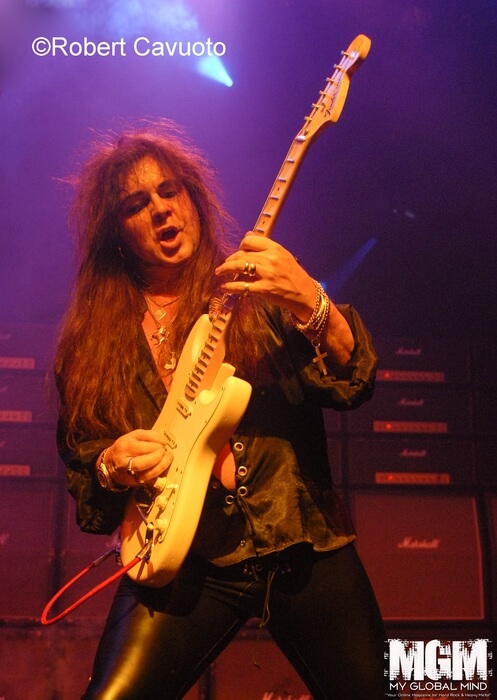
Robert Cavuoto: Classical music is a very different style of music with a unique set of disciplines and power needed for its creation. It goes beyond typical rock music; tell me about the disciplines required to create your style of neo-classical playing?
Yngwie Malmsteen: Great question! The disciple of playing and practicing is something that I have applied to my playing for years and years and years. In the late 70s, nobody played the guitar like I did with six-string arpeggios. I wasn’t taking lessons online, reading it out of a book, or listening to a record where I learned from. It came from the inside. Of course, my huge inspiration for classical violin was there, but it was not done on the guitar. It was done on the violin! It is almost impossible to play those parts. I got to a point when I picked up the guitar; instead of playing a pentatonic boxed scale, I would go off [sings an example of super fast playing] with arpeggios. It was the natural thing for me to do. So when I pick up the guitar now, I’m playing things that have never been written; I’m just improving. The solos on the records are all improvised; there are no pre-written parts for my solos. It is something that is hard-wired for me! I know what I’m doing, but it’s just there for me to tap into. So the disciple that I have developed is just something that has evolved from all the years prior. The true achievement of being a composer, writer, or soloist, anything you decided to do in life, you have to find where your passion lies. Not to pretend or do it for all the wrong reasons like being rich or meeting girls. Many people have done it for that and were successful; God bless them [laughing]. I go deeper than that. It’s important to find your purpose. You don’t want to be a jack-of-all-trades and a master of none. I’m not knocking anyone’s approach, but I found my purpose. Interestingly, I found an old cassette tape of me in Powerhouse from 1978. I labeled it “heavy symphonic metal rock!” There was no such thing as neo-classical then. I found where my guitar journey was going. It’s important to have that passion; if you don’t, you lose your mission. When I was eight years old, I got Deep Purple’s Fireball with the double bass playing and the sound of the Strat through a Marshall amp. That combination was key. As soon as I could afford a Marshall, I got one because I already had the Strat. I didn’t want to get rid of those; I just wanted to find different notes. I wanted to play in the style of Vivaldi and Bach through a Marshall stack to see what the fuck happened [laughing]. That is really where it comes from!
Robert Cavuoto: I’ve seen you perform countless times over the years. You single handily transformed live instrumental music, which can sometimes have connotations of someone staring at their fretboard meticulously playing to your creation of a high-energy show while still playing perfectly. Tell me how you achieved that?
Yngwie Malmsteen: Wow, thank you. I think if you looked a little closer, the notes weren’t all so perfect [laughing]! I try to make it as clean as possible while not stand there like a fucking statue. I started playing guitar when I saw Hendrix smash one up on TV. I was intrigued by the whole showmanship thing. He was the master of it. If you go to see a live show, entertainment has to be there. I figured out ways and tricks of turning the guitar around without making it sound too horrible. I worked on it as I thought it was part of the deal. Why play a song like you hear on the record? You have to add personality and have a personal show.
Robert Cavuoto: In 2018, I saw you play with Generation Axe; towards the end, Steve Vai joined you for “Blackstar.” I was expecting him to mimic your playing style, but he used his own style of playing when interrupting the song. Was that by choice not to duplicate your style exactly?
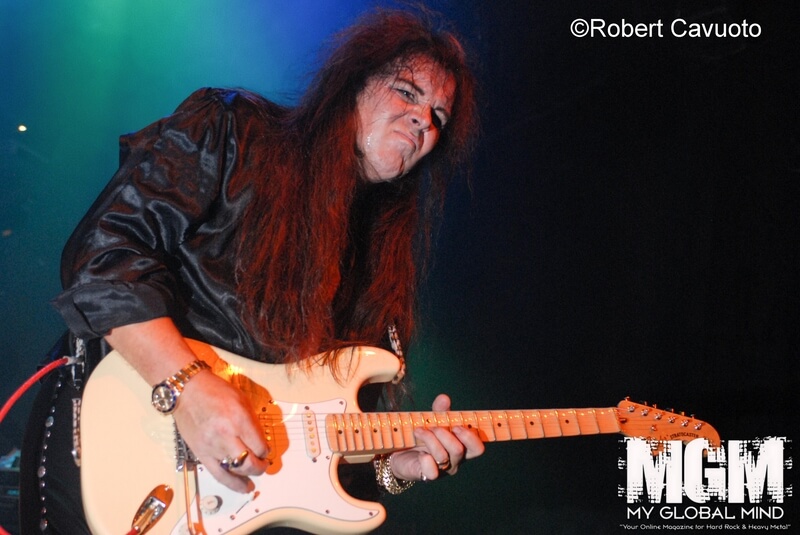 Yngwie Malmsteen: One of the beauties of guitar players and musicians, in general, is their unique style. With Steve, you know he has a unique playing style which is not so common. It’s more common for people to all sound the same. He took the second harmony part. It is played like it was written, but with his approach, we didn’t sound the same, and to me, that’s the way it should be. I think that is one of the highlights of the show.
Yngwie Malmsteen: One of the beauties of guitar players and musicians, in general, is their unique style. With Steve, you know he has a unique playing style which is not so common. It’s more common for people to all sound the same. He took the second harmony part. It is played like it was written, but with his approach, we didn’t sound the same, and to me, that’s the way it should be. I think that is one of the highlights of the show.
Robert Cavuoto: The first time I saw you perform was opening for Dio. I know that you are a big fan of his and even covered Aerosmith’s “Dream On” together. Did you ever try and connect on creating original music?
Yngwie Malmsteen: Ronnie and I had many late-night talks about that! We knew that we were both too hard-headed and born leaders. I think we would have complimented each other well. We had such mutual respect for each other. The first time I ever saw him perform was with Rainbow when I was a little kid in 1976. I go way back with him. When I played with Steeler, he used to come and check me out all the time. I don’t know what he was thinking at the time. We played on stage together and in the studio more than once. It was always great, but as far as a long-term thing, it would have been like two bulls in the china shop [laughing]. He was a great guy and truly missed.
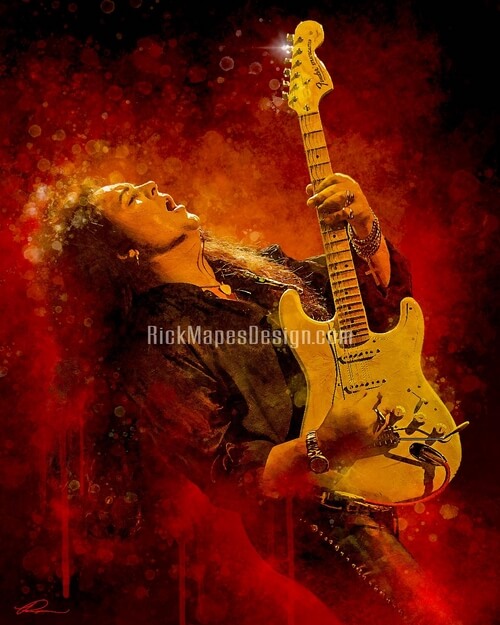
Robert Cavuoto: In your book, you talked about wanting to go higher and faster than anyone has ever done. Do you think you achieved that goal?
Yngwie Malmsteen: I don’t think I was comparing myself to anyone else; I had this weird goal in my mind where I wanted to go. When I first discovered the sound of arpeggios, which means “broken chord,” I never heard anyone play like that. It was something I heard in my mind. It wasn’t that I was saying I wanted to be faster than anyone else; that wasn’t what I meant to say. I always thought it was weird when people made comparisons. When I first came on the scene, people compared me to Eddie Van Halen. You can’t compare yourself to him; nobody can! I don’t think it is right for anyone to be compared to anyone else because it’s not a sport.
ART: mlgpress.com/yngwie–malmsteen/
facebook.com/
instagram.com/yngwiemalmsteen_
https://www.youtube.com/
